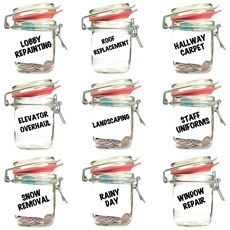
These days, just about everyone is cutting back on spending, either to make ends meet, saving for something special or a rainy day, paying off debt or funding their retirement. Consumers are cutting coupons, looking for deals and keeping a close eye on their dollars. Whenever costs or fees go up and consumers have to pay more, they invariably get upset.
The last thing that residents want to hear is that association fees are being raised. Realistically though, to keep a building properly cared for and thriving financially, fees will need to be raised regularly and fairly. And, in some cases, associations are forced to raise fees because they haven’t put enough money aside for a major repair.
Underfunded
Stephen DiNocco, principal of Affinity Realty & Property Management in Boston, estimates that approximately 25 to 30 percent of associations fail to either properly fund their reserve accounts or lack a viable plan or ability to fund when needed.
A Community Associations Institute (CAI) study in 2012 found that cash-strapped associations are trying everything to make do. To compensate for a cash shortfall, the CAI study shows 38 percent have postponed planned capital improvement projects, 35 percent have reduced landscaping services, 31 percent have reduced contributions to their reserve accounts—funds that are set aside for major maintenance and repairs, 23 percent have borrowed from the association’s reserve account, 16 percent have levied special assessments, 12 percent are allowing residents to perform minor tasks in the community and 6 percent have borrowed from banks and other lenders.
“Many associations have taken to funding through borrowing to supplement their savings plan,” DiNocco says. “So although reserve levels may be less than optimal, the capacity to perform is intact.”
Michael Callahan would skew the percentage much higher. “I would say a safe estimate would be in the 60 percent to 70 percent range,” says Callahan, principal of Advanced Reserve Solutions, Inc. in New England and a Community Associations Institute-designated Reserve Specialist.
“In that range, some associations are just off a little, while others are way off,” he says. “The main reason, in my opinion, is that, when first built, the association started off with an artificially low contribution to the reserves set up by the original budgets and the association waited too long to have a reserve study done in order to get a more accurate needed contribution to the reserves.”
Nik Clark of Reserve Advisors in Hartford, Connecticut says that about 80 percent of associations his firm completed studies for are significantly underfunded when the initial study is performed. Marian Servidio, president of Park Place Management Co., in South Burlington, Vermont, says that 100% of the associations can’t keep up with the increase in costs when studies are updated in five years.
“I think that while many associations have a better perspective on their realistic reserve needs because of having conducted reserve studies, due to delinquencies/tight budgets, desire to keep fees low during hard economic times, many associations still haven’t improved their reserves. But just knowing where you stand does allow associations to plan and prepare for upcoming expenses (even if they will need to special assess for them or take a loan),” says Clark. “In addition, they can prioritize repairs to allocate insufficient funds to projects that are most pressing.”
In recent years, both Fannie Mae and Freddie Mac (the Federal National Mortgage Association and the Federal Home Loan Mortgage Corporation), government-sponsored enterprises that control the secondary mortgage market, have passed stricter lending guidelines for condominium financing. Among those rules, the Federal Housing Administration (FHA) now requires that condominiums set aside at least 10% of their operating income towards a capital reserve account. For example, if the annual budget is $200,000, then the association must set aside $20,000 for its capital reserve fund.
“The main problem with the Fannie, Freddie requirements is it is based on a one-number-fits-all, and that is just not the case when it comes to reserve funding,” says Callahan.
Necessary Funding
Just as an individual needs an emergency fund in case of a job loss or an unexpected car repair, an association needs a financial reserve to take care of such major repairs as roof leaks, plumbing problems or foundation issues.
Like most things, repair costs rise, and the cost of a roof replacement today will most likely be higher than a roof installed 10 years ago. As a result, it’s vital to properly fund the reserve by raising fees accordingly. To obtain approval for an increase in fees, management must meet with the board and present their reasons for the increase and then face a sometimes more difficult challenge—informing the unit owners.
“Once the members of the board of directors are on board with the idea of properly funding the reserves, the hard part begins, which is educating, proving and selling the idea of higher reserve funding,” says Callahan. “Proper reserve funding is both needed and the benefits of proper reserves outweigh the theory that higher dues decrease home values. Associations in a good state of repair, with proper budgets, are more valuable than those without either or without one or the other.”
If an association is facing a shortfall in its reserve, it’s important to notify the board early on. “If a board sees that, for example, in the first quarter that exceeding the current year’s budget on a particular line item is inevitable, tell the membership and explain why,” says Servidio. “Tell them what has changed that drives the cost increase, and to anticipate that the budget for the following year will increase to compensate for such. Explain early, explain often!”
Clark adds that boards want to be informed to prevent any potential liability claims. “They want to protect themselves from liability claims for not, at least, bringing proper reserve needs to the attention of the association. Homeowners often tend to think very short-term and while, in theory, they know a reserve fund is something that should be funded, they are concerned about assessments and tend to want to bury their head in the sand sometimes.”
Don’t Get Caught Short
A common approach to obtaining board and resident approval is to show the current level of reserve funding and how it will not properly fund the reserves. “Then show them if the reserves are increased to the proper level then needed repairs and/or replacements will be able to be made without needing a special assessment,” says Callahan. “In return, it will help keep the association in a good state of repair, which will help protect or increase the home values.”
Reserve studies are done by a qualified engineer who calculates how much money is needed to cover replacements and repairs throughout the building or property. For example, let’s say the engineer determines the roof has seven life years left before it needs to be replaced. The cost is $100,000. To raise that much money, the association will need to save a minimum of $14,000 per year just to cover this replacement (it’s assumed that you don’t have anything put aside). The reserve study calculates all of the systems. Then it can be determined if fees need to be raised to cover the cost.
“I think it’s far easier for managers to justify a fee increase to owners and boards when they have a well-documented professional custom reserve study that took a critical look at the real condition of their property and projected specific remaining useful lives based on condition (not just using averages) and gave them specific replacement costs based on local costs data vs average cost data,” says Clark.
Without a professional study, it makes it easy for people to question the manager’s assessment — but an independent reserve study provider without a conflict of interest who takes a critical look and provides a custom report, that carries a lot of credibility.”
Servidio says that she alerts members on an annual basis in the annual meeting announcement about the financial state of an association. “We continue to alert those that don’t have the capital funds set aside for replacements to the needs that are approaching, as well as the necessity of a special assessment,” she says. “We update those who have the reserves on the state of the reserve balances versus the quotes that we are obtaining.”
She does say that no matter how much communication is happening, there is bound to be someone who didn’t see or hear it and is surprised by the news. “The other problem is that a capital reserve study may neglect to include the fact that a part is needed on a $5,000 front door access system, but the manufacturer doesn’t make parts for it anymore, so it jumps up on the replacement ladder. Surprise!” she says.
From a marketing perspective, condos were once sold on the basis of low monthly fees, but raising fees can cause a potential issue. Callahan emphatically agrees that condos that were sold on the basis of low monthly fees are still a lingering problem.
“Often at BOD meetings, the first concern is that if they raise the dues in order to properly fund the reserves, their dues will be higher than the association down the street,” says Callahan. “This should not be the focus, the focus should be on their association and what is right for them in order to properly fund their reserves and maintain their property in a good state of repair.”
Clark says that there is more truth-in-marketing from developers in terms of realistic fee structures that reflect reserve contributions, but there is still a long way to go. “With lots of bank-owned properties and issues with no-fee collection from homes in foreclosure, the industry still has a way to go to adopt best practices for new properties. But we do see efforts by reputable developers to conduct studies very early on to properly project accurate fees.”
Advance Notice is Essential
Clark says that the best way to raise fees without inciting a riot is to give unit owners as much advance notice as possible. “The sooner you do a reserve study, the sooner you can let people know what’s coming so that they can make personal financial decisions,” he says.
Mortgage and insurance companies are also looking closer at reserves, because if they are not properly funded it can cause non-approvals of home loans and/or higher insurance rates.
“Not having proper reserves can increase the need for special assessments, which does not look good when trying to sell,” says Callahan.
But isn’t it better to cut the budget rather than raise fees? “I would never recommend cutting the budget in order to decrease the dues. That just creates an artificial and misleading funding plan that would be basically useless,” says Callahan.
However, other managers have worked on cutting budgets. “The most worthwhile are capital reserve budgets, but those line items that beautify the property and are somewhat arbitrary can be discussed or conduct a straw poll of the membership and see if they want to spend the money for such items,” says Servidio.
Servidio says she would have lengthy discussions about cutting back on maintenance costs, for instance. “Back in the day, a community would never think about asking for volunteers to change light bulbs, sweep cobwebs off buildings or wash down siding, paint sign posts and pick up debris after a wind storm, but some of my associations happily do that. They find it brings a sense of community and they feel good that they aren’t paying a maintenance man $40 an hour to change a few bulbs.”
Clark says that major items, such as roofs, are always going to be critical. “Failure to replace a roof can add thousands in repair costs for water damage,” he says.
Raising fees might be beneficial for the association, but in tough economic times it can cause financial hardships for unit owners. “The bottom line is that an association cannot jeopardize the entire community by living at the lowest level of affordability,” says Callahan. “That is a tough one; no one wants to create a financial hardship for a unit owner. I have seen this happen first-hand. Often the unit owner will have to make a change in their own finances or they may even have to decide if they can continue to live in the association. It is not easy and no one wants to put some in the position to make these tough decisions.”
The reality is the property continues to age whether they can afford to make repairs or not, and many deferred repairs can create additional expenditures. Raising fees is something that is necessary, but by raising fees regularly and fairly, it should prevent special assessments and financial hardship for all involved.
Lisa Iannucci is a freelance writer and a frequent contributor to New England Condominium.






Leave a Comment